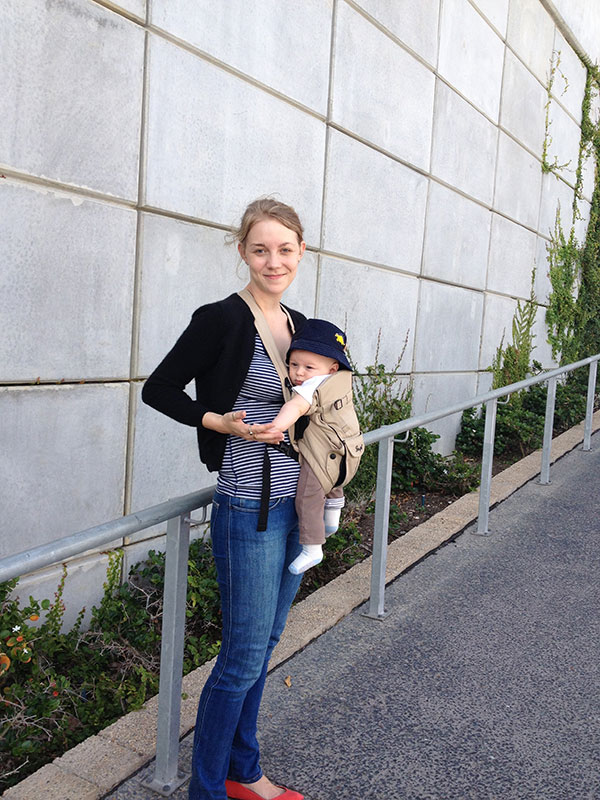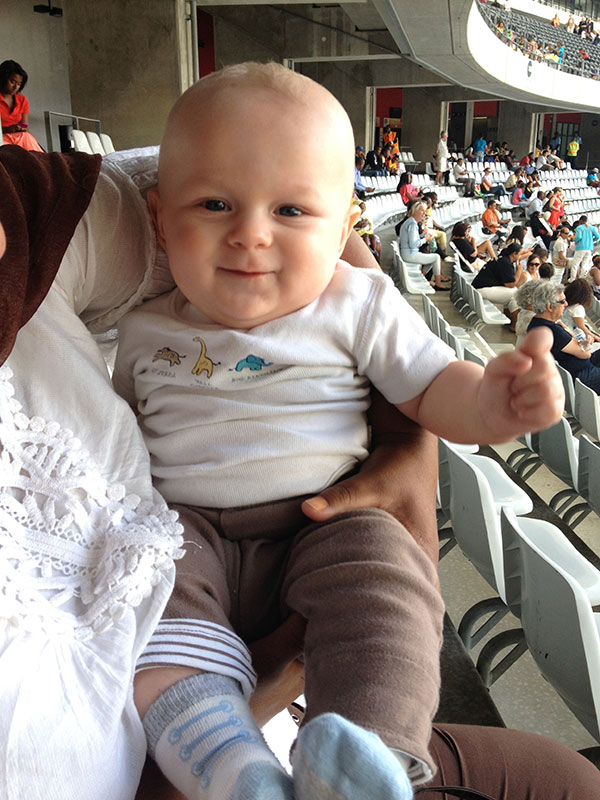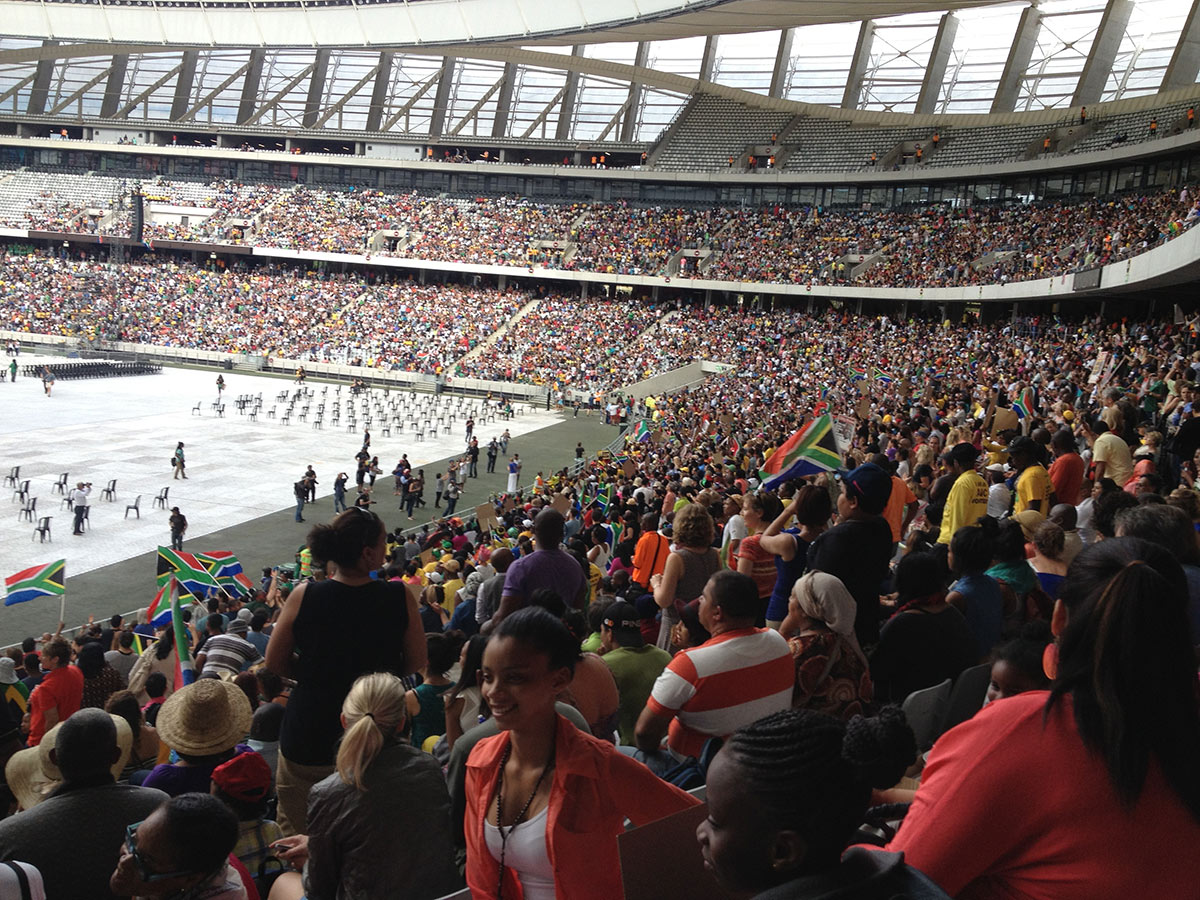The night Nelson Mandela died, a violent wind blew dark clouds across the yellow sky in Cape Town.
The air here is never completely still; it brushes against your face with the weight of the sea every time you step outside. Once every few weeks it’s so windy that the flower sellers pack up early, cigarettes are lit in alcoves, alarm systems go off around the city, triggered by tumbling debris. You don’t go out on a night like that if you don’t have to. This is one of the things my husband and I have learned in our two weeks of living here.
We were driving home from a movie when we heard the news. We cranked the volume to drown out the wind, and listened to the announcers repeat the few details about where and when Mandela had passed away. They knew that they had to keep repeating the same details until there was something more to say.
To tell the God’s honest truth, I recognized that I wasn’t sad, exactly, in that moment.
This is it, is what I thought instead. Now starts the upheaval of mourning and celebration.
The next morning, mourners slowly began to fill the streets downtown. It was a pink and yellow sunlight morning, a languid summer morning when the air is clear and fat with flower perfume and birdsong before the heat has flattened everything. No official events had been announced yet, except for an interfaith service on the Grand Parade where Mandela had made his first speech after being released from prison 23 years ago. Everyone was wondering what would happen, now that the icon had finally passed away.
Some people stayed home from work, or canceled plans with friends to avoid driving at all. David’s management had already briefed the office on the expected logistical impacts over the coming days. Severe traffic disruption: Highly Likely. Civil Unrest: Unlikely.
As I drove David to work, we saw no ululation, no one rending their clothes or tearing their hair, no one sobbing, (we did see tears), and certainly no tension or looting. Instead, we saw singing, oh how Africa sings, and we saw lines around the block for tickets to the memorial service the mayor was planning for the next Wednesday. Tickets were distributed for free at Pick N Pay grocery stores, but they sold out the first day before I could get any.
On the news, we saw eulogies well worded in advance, flawlessly edited lifetime tributes, critical commentaries from friends and followers mournful but composed. The mayor announced a full schedule of memorial events in Cape Town, as other cities across South Africa announced their own.
Civil unrest was nowhere to be seen. Six months ago, people were more worried. Mandela wasn’t just a Gandhi figure. In fact, he wasn’t a Gandhi figure at all. We tend to use the same bland, worshipful terms to describe our greatest saints, and lump Mandela in with the likes of Mother Teresa, Martin Luther King, Jr., and Gandhi. We laud their peacefulness, justice, generosity, and especially their ability to forgive.
As I read Mandela’s autobiography, however, I was constantly reminded that he was a freedom fighter. He led a revolution, espousing non-violence only as a strategy and not as a principle. He trained in guerrilla warfare, secured donations for arms, and planned for a long bloody fight when the peaceful strategies were failing. When Mandela was released from prison, it was a violent emotion that overcame the people South Africa, even though it was the violence of joy.
When such an icon dies, the violence of grief can be overwhelming also, can transmute into rage at past ideals not lived up to in the present. Especially when the current ANC president Jacob Zuma is perceived so cynically for his scads of wives and ridiculous personal spending, you might expect a weight of disillusion to come crashing to the floor when the saint who kept it up in the air is no more.
Luckily for Cape Town, Johannesburg, and the world, we were allowed the rare opportunity to prepare for Mandela’s death in advance. He was first hospitalized back in June. The infrastructures of government and business have been shifting their great bulks into the action of preparation ever since, and so have people been preparing their hearts and minds.
So at the stadium on the day of the Cape Town memorial (my nanny’s husband managed to get tickets for her and me at the last minute), the mood was muted, that of a huge group of people who are uncomfortably hot as they wait to get into a concert.
 Spenny and I walking to the entrance.
Spenny and I walking to the entrance.
Inside, the crowd burst into color. The benefit of having a flag with so many colors (red, black, green, yellow, white, blue) is that you can wear any of them and be patriotic, and that’s what everyone did. Some draped South African flags around their shoulders or wore tee shirts depicting Mandela’s face, others just wore the brightest outfits they had and waved their flags in the air. As for the crowd’s racial diversity, I wished that the 1958 Mandela could have seen us.
And the program? I expected a lot of speeches, but there were hardly any. It was a memorial concert. Everyone sang, swayed, and danced in the sun. There was no grief in evidence. The people were moved by celebration and a great pride. No matter that Obama thanked South Africa for sharing Mandela with the world, it’s South Africans who will always be his real children, and they are proud of that.
You hardly ever hear the man referred to as Mandela here. That was the English name given him, one which does not evoke the sense of community and vaunted history that accompany South Africa’s more common names for him. He is called Mandiba, the name of his clan ancestor and a term of respect, and he’s also often called Tata, which means father.
On BBC, they kept referring to him as South Africa’s first black president. After having paid such close attention to the South African celebrations, something about the term bothered me. It’s reductive, and not only that, reduces the man to the wrong essence.
To say that he was the first black president is to imply that, like the U.S., South Africa could have elected a black president in any old recent decade they wanted to, and Mandela just happened be the first. But Madiba was the struggle, not the end result of it. We westerners call him the “first black president” almost as if we’re grateful to Mandela for relieving us of the embarrassment of racism. There, now South Africa finally had a black president, and we can mark his name down for the books. Let’s move on.
Perhaps they explain Mandela by way of “first black president” because “the man who fought for a lifetime to end racial injustice in South Africa and did end Apartheid” is a mouthful and “liberator of black South Africans” makes people uncomfortable.
Despite my growing feeling of understanding of what Madiba has been to South Africa, and my appreciation for South Africa’s vibrant celebrations of his life, I don’t have the right to call him Father. I’m an outsider here. In my schools, we didn’t learn much about him. Later, when I began to learn more, and attended his memorial, I didn’t even know the words to the national anthem as the whole stadium rose and sang warmly together. As David and I go through the machinations of trying to start a new life here, our sadness for Mandela’s death is perhaps not as passionate as it should be.
Even as I seek to learn enough to appreciate South Africa through a South African’s eyes and to read about the full history of Mandiba and Apartheid, as a white woman I feel the unpleasant feeling of exclusion as I learn of Mandela’s early belief that non-blacks shouldn’t be allowed to participate in the ANC, or even his mid-life hope that South Africa would once again become a Black African Nation led by Black Africans.
The only emotion I can offer is gratefulness and admiration for both Mandela and for the dignified way his nation mourns for him. Days after his death, it sinks in that my son won’t remember the time that Madiba lived.
Today, two weeks after the violent winds that heralded Madiba’s death, the air is neither noisy nor perfumed. There isn’t much wind, only a half-hearted shifting of weight in the air as one walks. The memorial events are over, though tented “Places of Tribute” still gather visitors and stuffed animals. Christmas is next week, and while the festivities are nothing like our snow rituals in the Pacific Northwest, everyone’s thoughts are already drifting forward, the holidays and summer vacations beginning in earnest.
 At five months, our son is now “walking,” as David or I hold his forearms and guide him across the counter-top. We list off to one another all of the Christmas movies that Spencer will need to watch to gain a proper appreciation for a U.S. Christmas. We know that if we stay here, he will feel more South African than American, and I don’t know how I feel about that. Though Spencer couldn’t witness Nelson Mandela’s incredible life as David and I have, though it will only be another one of the stories he learns, he may at least gain the access I cannot, which is the special violence of joy shared by Madiba’s South African children.
At five months, our son is now “walking,” as David or I hold his forearms and guide him across the counter-top. We list off to one another all of the Christmas movies that Spencer will need to watch to gain a proper appreciation for a U.S. Christmas. We know that if we stay here, he will feel more South African than American, and I don’t know how I feel about that. Though Spencer couldn’t witness Nelson Mandela’s incredible life as David and I have, though it will only be another one of the stories he learns, he may at least gain the access I cannot, which is the special violence of joy shared by Madiba’s South African children.

Leave a Reply